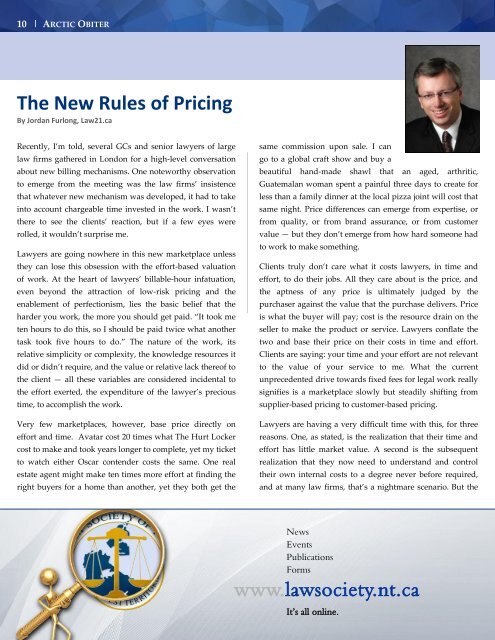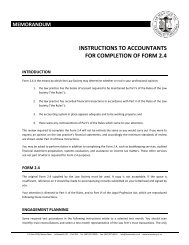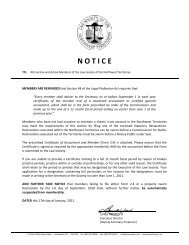ARCTIC OBITER
Arctic Obiter - May 2010 - Law Society of the Northwest Territories
Arctic Obiter - May 2010 - Law Society of the Northwest Territories
- No tags were found...
Create successful ePaper yourself
Turn your PDF publications into a flip-book with our unique Google optimized e-Paper software.
10 | <strong>ARCTIC</strong> <strong>OBITER</strong><br />
The New Rules of Pricing<br />
By Jordan Furlong, Law21.ca<br />
Recently, I’m told, several GCs and senior lawyers of large<br />
law firms gathered in London for a high-level conversation<br />
about new billing mechanisms. One noteworthy observation<br />
to emerge from the meeting was the law firms’ insistence<br />
that whatever new mechanism was developed, it had to take<br />
into account chargeable time invested in the work. I wasn’t<br />
there to see the clients’ reaction, but if a few eyes were<br />
rolled, it wouldn’t surprise me.<br />
Lawyers are going nowhere in this new marketplace unless<br />
they can lose this obsession with the effort-based valuation<br />
of work. At the heart of lawyers’ billable-hour infatuation,<br />
even beyond the attraction of low-risk pricing and the<br />
enablement of perfectionism, lies the basic belief that the<br />
harder you work, the more you should get paid. “It took me<br />
ten hours to do this, so I should be paid twice what another<br />
task took five hours to do.” The nature of the work, its<br />
relative simplicity or complexity, the knowledge resources it<br />
did or didn’t require, and the value or relative lack thereof to<br />
the client — all these variables are considered incidental to<br />
the effort exerted, the expenditure of the lawyer’s precious<br />
time, to accomplish the work.<br />
Very few marketplaces, however, base price directly on<br />
effort and time. Avatar cost 20 times what The Hurt Locker<br />
cost to make and took years longer to complete, yet my ticket<br />
to watch either Oscar contender costs the same. One real<br />
estate agent might make ten times more effort at finding the<br />
right buyers for a home than another, yet they both get the<br />
same commission upon sale. I can<br />
go to a global craft show and buy a<br />
beautiful hand-made shawl that an aged, arthritic,<br />
Guatemalan woman spent a painful three days to create for<br />
less than a family dinner at the local pizza joint will cost that<br />
same night. Price differences can emerge from expertise, or<br />
from quality, or from brand assurance, or from customer<br />
value — but they don’t emerge from how hard someone had<br />
to work to make something.<br />
Clients truly don’t care what it costs lawyers, in time and<br />
effort, to do their jobs. All they care about is the price, and<br />
the aptness of any price is ultimately judged by the<br />
purchaser against the value that the purchase delivers. Price<br />
is what the buyer will pay; cost is the resource drain on the<br />
seller to make the product or service. Lawyers conflate the<br />
two and base their price on their costs in time and effort.<br />
Clients are saying: your time and your effort are not relevant<br />
to the value of your service to me. What the current<br />
unprecedented drive towards fixed fees for legal work really<br />
signifies is a marketplace slowly but steadily shifting from<br />
supplier-based pricing to customer-based pricing.<br />
Lawyers are having a very difficult time with this, for three<br />
reasons. One, as stated, is the realization that their time and<br />
effort has little market value. A second is the subsequent<br />
realization that they now need to understand and control<br />
their own internal costs to a degree never before required,<br />
and at many law firms, that’s a nightmare scenario. But the<br />
News<br />
Events<br />
Publications<br />
Forms<br />
www.lawsociety.nt.ca<br />
It’s all online.
















